
-
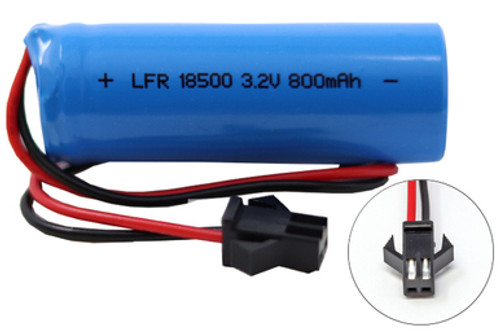
3.2V 800 mAh (18500) LiFeP04 Battery Pack for Gama Sonic Solar Lights
$23.99As low as:- Buy in bulk and save
Bulk discount rates
Below are the available bulk discount rates for each individual item when you purchase a certain amount
- Buy 2 - 6 and pay only $23.99 each
- Buy 7 - 19 and pay only $18.59 each
- Buy 20 - 65 and pay only $16.59 each
- Buy 66 or above and pay only $16.59 each
-

-

3.2V 1500 mAh LiFeP04 Battery Pack for Gama Sonic Solar Lights (Includes Male Adapter)
$25.99As low as:- Buy in bulk and save
Bulk discount rates
Below are the available bulk discount rates for each individual item when you purchase a certain amount
- Buy 2 - 32 and pay only $25.99 each
- Buy 33 - 43 and pay only $20.69 each
- Buy 44 or above and pay only $20.69 each
-

-

3.2 Volt 32700 LiFePO4 Battery (6000 mAh)
$30.59As low as:- Buy in bulk and save
Bulk discount rates
Below are the available bulk discount rates for each individual item when you purchase a certain amount
- Buy 2 - 4 and pay only $30.59 each
- Buy 5 - 16 and pay only $27.49 each
- Buy 17 or above and pay only $27.49 each
-

-
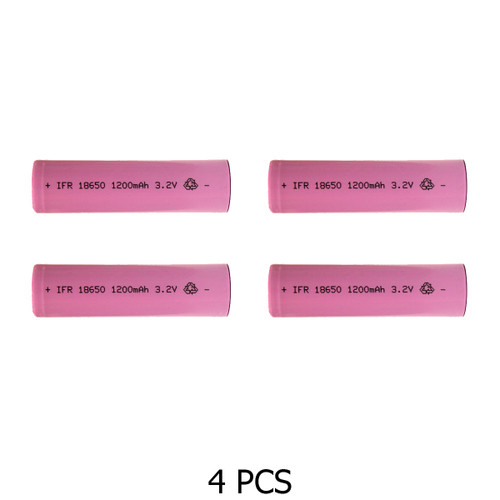
-

3.2V 3000 mAh LiFeP04 Battery Pack for Gama Sonic Solar Lights (Includes Male Adapter)
$31.99As low as:- Buy in bulk and save
Bulk discount rates
Below are the available bulk discount rates for each individual item when you purchase a certain amount
- Buy 2 - 23 and pay only $31.99 each
- Buy 24 - 31 and pay only $28.79 each
- Buy 32 or above and pay only $28.79 each
-

-

-

-
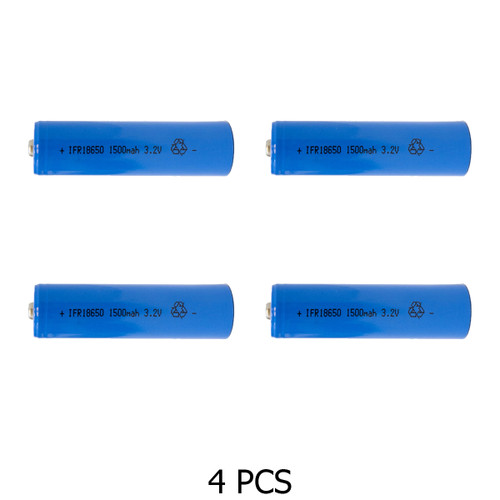
-

-
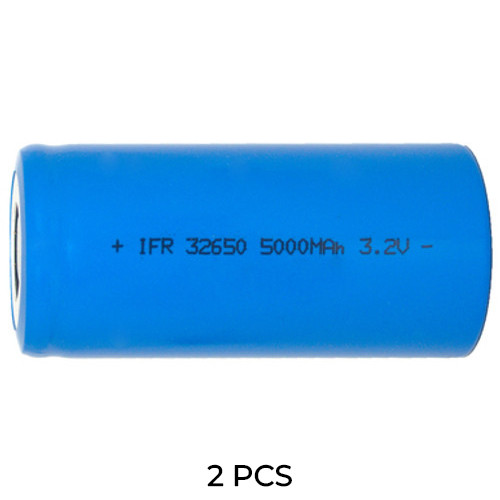
-

-

-

3.2 Volt LiFePO4 Battery Pack with Leads (3000 mAh)
$42.59As low as:- Buy in bulk and save
Bulk discount rates
Below are the available bulk discount rates for each individual item when you purchase a certain amount
- Buy 2 - 17 and pay only $42.59 each
- Buy 18 - 23 and pay only $38.29 each
- Buy 24 or above and pay only $38.29 each
-
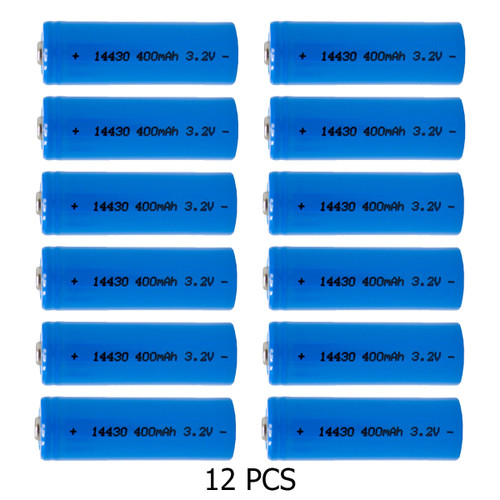
-

-

3.2 Volt Lithium Phosphate Batteries: Reliable Power for Outdoor Solar Lights
As the demand for renewable energy solutions continues to grow, 3.2 Volt Lithium Phosphate batteries (commonly referred to as LiFePO4 batteries) have emerged as a reliable and efficient power source, particularly for outdoor solar lights. Known for their high energy density, long lifespan, and exceptional safety features, these batteries are increasingly replacing traditional lead-acid batteries, which are heavier, bulkier, and require frequent maintenance.
What Are 3.2 Volt Lithium Phosphate Batteries?
Lithium Phosphate batteries, or LiFePO4 batteries, are a type of rechargeable lithium battery that offers several advantages over traditional battery technologies like lead-acid and lithium-ion (Li-ion). With a nominal voltage of 3.2 volts, these batteries are particularly suited for solar applications, offering consistent performance and durability.
They are commonly used in:
Outdoor solar lights
Renewable energy storage systems
Electric vehicles
Portable electronics
Key Advantages of 3.2 Volt Lithium Phosphate Batteries
1. High Energy Density
One of the standout features of Lithium Phosphate batteries is their high energy density, meaning they can store a large amount of energy in a compact size. This makes them ideal for applications like outdoor solar lights, where space is often limited.
Benefits:
Supports small and lightweight designs.
Provides consistent power throughout the battery’s discharge cycle.
Maximizes the efficiency of solar lighting systems.
2. Long Lifespan
Lithium Phosphate batteries are known for their impressive longevity, often lasting thousands of charge and discharge cycles. This long lifespan reduces the need for frequent replacements, making them cost-effective over time.
Benefits:
Reliable power for several years.
Lower total cost of ownership compared to traditional batteries.
Ideal for devices that operate daily, such as solar lights.
3. Excellent Safety Features
Safety is a critical consideration for batteries, especially those exposed to outdoor environments. Lithium Phosphate batteries are highly resistant to overheating, fires, and thermal runaway, making them safer than many other lithium-based batteries like Li-ion or Lithium-Polymer.
Benefits:
Can handle extreme temperatures and weather conditions.
Reduces the risk of battery failure or accidents.
Safe for use in outdoor environments with varying conditions.
4. Low Self-Discharge Rate
LiFePO4 batteries have a very low self-discharge rate compared to lead-acid or other lithium batteries, allowing them to retain their charge over extended periods of non-use. This is especially useful for solar lights that may not receive consistent sunlight.
Benefits:
Maintains charge for extended periods during cloudy days or winter months.
Reliable performance even with infrequent charging.
5. Environmentally Friendly
Lithium Phosphate batteries are considered more eco-friendly than other battery types. They are:
Free from harmful heavy metals like cadmium and lead.
Fully recyclable at the end of their lifespan.
Applications of 3.2 Volt Lithium Phosphate Batteries
1. Outdoor Solar Lights
LiFePO4 batteries are particularly well-suited for solar lighting systems, offering consistent performance and the ability to withstand harsh outdoor conditions. They power devices such as:
Garden lights
Pathway lights
Security lights
Streetlights
Their compact size and durability make them a perfect match for these applications.
2. Renewable Energy Storage
In addition to solar lights, these batteries are used in renewable energy systems to store power generated by solar panels or wind turbines. Their long cycle life ensures reliable energy storage and usage over time.
3. Portable Power Solutions
Lithium Phosphate batteries are commonly used in portable devices such as:
Camping equipment
Power banks
Portable fans and lamps
Their lightweight design and long-lasting power make them ideal for these applications.
4. Electric Vehicles and Scooters
While typically associated with larger battery packs, smaller 3.2 Volt Lithium Phosphate batteries are sometimes used in systems for electric scooters, bicycles, or as part of modular energy solutions.
Key Considerations When Choosing a 3.2 Volt Lithium Phosphate Battery
When selecting a battery for your outdoor solar lights or other applications, it’s essential to consider the following factors:
1. Capacity (mAh or Ah)
Choose a battery with a capacity that matches the power requirements of your device.
Higher capacity batteries provide longer runtimes but may be larger and heavier.
2. Compatibility
Ensure the battery is compatible with your solar light’s charging system.
Check specifications for voltage and size to avoid mismatched components.
3. Brand and Quality
Trusted brands like Renogy, Tenergy, and Goal Zero are known for producing high-quality LiFePO4 batteries.
Investing in a reputable brand ensures reliability and safety.
4. Environmental Factors
If the battery will be exposed to extreme temperatures, select one with enhanced weather resistance.
Maintenance Tips for 3.2 Volt Lithium Phosphate Batteries
To maximize the lifespan and performance of your battery, follow these maintenance tips:
Proper Storage:
Store in a cool, dry place when not in use.
Avoid direct sunlight or freezing temperatures.
Avoid Overcharging:
Use a compatible charging system with overcharge protection.
Monitor Performance:
Regularly check battery capacity and replace it when it begins to degrade.
Recycle Responsibly:
Dispose of old batteries at designated recycling centers to reduce environmental impact.
3.2 Volt Lithium Phosphate batteries are a reliable, efficient, and safe power source, making them an ideal choice for outdoor solar lights and various other applications. Their high energy density, long lifespan, and excellent safety features set them apart from traditional lead-acid and other lithium batteries.





